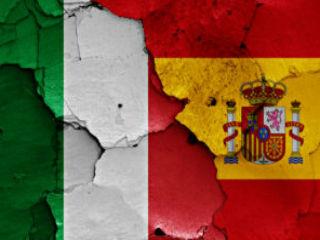We write at the very beginning of June 2018. Two new national governments were sworn in in the 3rd and 4th biggest economies of the Euro-zone

Leaving the euro is not on the agenda in Rome, but there is no doubt that the new Italian government will be on a collision course with ‘Brussels’ over the tight strictures of the single currency and the fiscal stance that it demands.
by
N. Peter Kramer
Two new Prime-Ministers entered the EU arena. One from Italy, Giuseppe Conte; one from Spain, the Socialist Pedro Sanchez.
Although none of the new Italian coalition partners campaigned to leave the Euro, there was speculation about the new government’s commitment to the Euro. Uncomfortable memories of the Eurozone sovereign debt crisis in 2010 re-awakened. Bond yields spiked, ‘Brussels’ in the person of the German (!) Commissioner Oettinger, who not so long ago insulted Jews, women and Mediterranean Europeans, reacted in his usual arrogant and denigrating way. But the pressure has eased since Italy’s anti-establishment 5 Star Movement and the far-right Lega got the approval of their President, who, in the first instance, vetoed the new coalition, according to reliable sources, under the influence of ‘Brussels’.
Leaving the euro is not on the agenda in Rome, but there is no doubt that the new Italian government will be on a collision course with ‘Brussels’ over the tight strictures of the single currency and the fiscal stance that it demands.
Even if disaster has been averted up until now, the political fragility of the Eurozone remains very clear. ‘The guardians of the single currency failed to mend the roof while the sun was shining, and are now watching storms buffet their fragile edifice’, wrote the Financial Times.
How very different was the political change in Spain. Mariano Rajoy - a valued member of the EPP of Merkel, Tusk and Juncker - became the first Spanish prime minister in the country’s democratic history to be ousted by parliament.
Although Rajoy persevered that he had clean hands, the corruption scandals in his centre-right party Partido Popular, descendants of dictator Franco, brought him down. The scale of the corruption by the PP appears to be of such dramatic proportions that even the right wing leaning Spanish judiciary couldn’t overlook it anymore.
The new Spanish Prime Minister said the change in government would allow Spain to ‘recover the dignity of its institutions’. Sanchez pointed to Rajoy’s harsh actions against supporters of Catalan independence: for the eyes of the world, the dreaded Guardia Civil maltreated pregnant women, old people and fathers with children on their arms, who were participating in a peaceful demonstration in Barcelona.
Times have changed. Now, Pedro Sanchez needs the votes of the Catalan (and Basque) independent parties in the national Parliament to stay in power.







